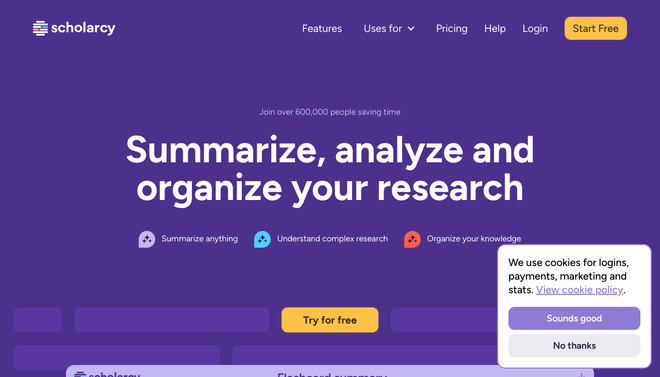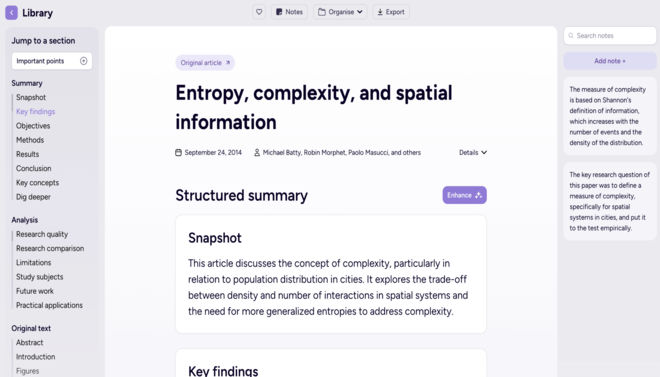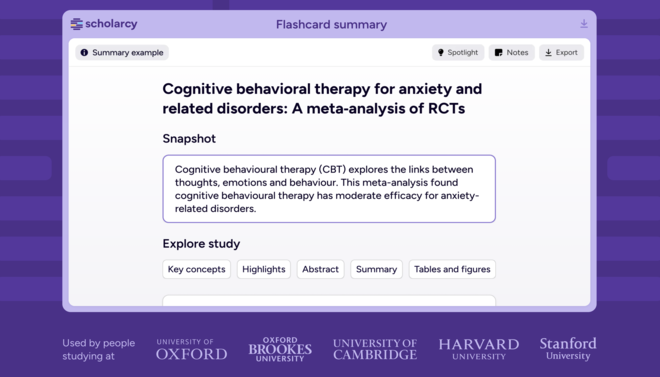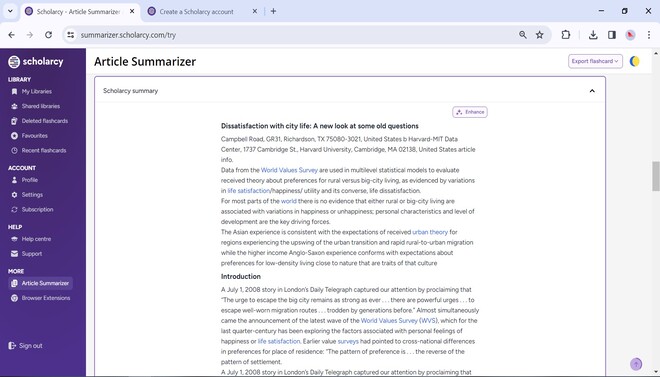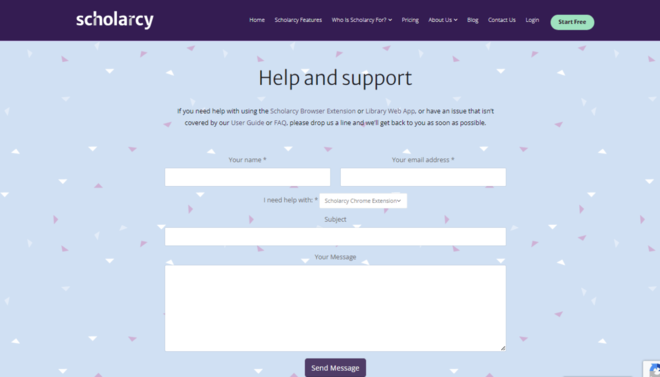Scholarcy is a highly specialized, AI-powered academic research assistant designed to significantly reduce the time spent reading and assimilating complex scholarly literature.
Introduction
Scholarcy is a highly specialized, AI-powered academic research assistant designed to significantly reduce the time spent reading and assimilating complex scholarly literature.
It is not a general summarizer; rather, it transforms lengthy academic articles, reports, PDFs, and even book chapters into interactive, structured summary Flashcards. The platform leverages Extractive AI trained specifically to pinpoint key findings, methods, results, and citations to guarantee zero hallucinations and provide factually accurate insights directly traceable to the source.
This focus on structured output, combined with tools for comparative analysis and organization, makes Scholarcy an indispensable tool for students, researchers, and professionals looking to manage massive reading lists and accelerate their literature reviews.
Extractive AI
Academic Focus
Flashcard Summary
Quality Indicator
Cross-Platform
Review
Scholarcy has its vertical specialization in academic research and its core feature, the Flashcard Summary. Its primary strength is the use of Extractive AI to ensure factually accurate, citation-backed summaries, solving the hallucination problem inherent in general LLMs. This capability, combined with unique tools like the Research Quality Indicator and direct export to reference managers (Zotero/Mendeley), provides unparalleled efficiency for students and researchers saving up to 70% of assimilation time.
While the free version is heavily restricted and some advanced features require a substantial institutional license, Scholarcy is the definitive tool for managing, synthesizing, and critically evaluating large volumes of scholarly content.
Features
Interactive Summary Flashcard
Converts a document into a structured, clickable summary format that extracts key concepts, methods, results, and references.
Research Quality Indicator
An AI-generated metric that gives an instant snapshot of a paper’s methodology and structure, helping users critically evaluate its rigor.
Literature Synthesis Matrix
Allows users to bulk export key findings, methods, and references from multiple papers into a comparative Excel format for easy synthesis.
Highlight & Notes Tool
Enables users to write private notes and highlights directly on the Flashcard view, which can be exported alongside the summary.
Citation & Reference Extraction
Automatically extracts all citations from a paper, offering one-click export in standard formats (BibTeX, RIS) for reference managers.
Clean Reading Experience
The tool extracts text from cluttered formats (PDFs, multi-column articles) into a clean, distraction-free reading pane.
Best Suited for
University Students
Ideal for quickly understanding large course reading lists and extracting key concepts for essays.
PhD Candidates & Researchers
Perfect for accelerating literature reviews, synthesizing findings across hundreds of papers, and managing large libraries.
Journalists & Writers
Excellent for quickly grasping complex research findings and ensuring accurate citation of academic sources.
Knowledge Workers
A strong tool for processing industry white papers, legal documents, and extensive business reports.
Research Teams
Useful for collaboration, sharing annotated flashcards, and building group libraries of shared knowledge.
Professionals (Evidence-Based)
Great for professionals who need to quickly verify claims or access the methodology behind research papers.
Strengths
Extractive AI guarantees zero hallucinations.
Reduces literature review time by up to 70% by instantly creating scannable, structured summaries.
Seamlessly integrates with Zotero/Mendeley and exports data into usable formats.
Highlights key terms and complex concepts within the text, accelerating understanding.
Weakness
The tool cannot process scanned PDFs or images of text.
The Free plan is heavily restricted.
Getting started with: step by step guide
The Scholarcy workflow is designed to streamline the academic research process from ingestion to synthesis and organization.
Step 1: Import Document
The user imports a research document (PDF, DOCX, URL, or plain text) by uploading it to the Scholarcy Library or using the Browser Extension.
Step 2: AI Analysis
Scholarcy’s AI analyzes the document’s structure, identifying methods, findings, arguments, and references.
Step 3: Generate Flashcard
The core output is instantly generated as an interactive Flashcard Summary, highlighting key claims and providing the Research Quality Indicator.
Step 4: Critical Evaluation
The user reviews the summary, adds notes, and uses the Research Comparison feature to understand how the paper fits into the wider field of study.
Step 5: Organize
The Flashcard is saved to the user’s searchable Scholarcy Library (or custom folders) for later retrieval using keywords or author names.
Step 6 : Synthesize:
For writing, the user uses the Export feature to create a literature synthesis matrix (Excel) or an annotated bibliography (Word) from a collection of Flashcards.
Frequently Asked Questions
Q: How does Scholarcy guarantee zero AI hallucinations in its summaries?
A: Scholarcy uses Extractive AI, which is trained only to extract existing, evidence-based sentences directly from the original paper. It does not invent or synthesize new information, making its summaries factually true to the source.
Q: Can I use the free browser extension for unlimited summaries?
A: No, the free browser extension is primarily a limited trial, typically allowing only around one summary per day. Unlimited summarization requires the paid Scholarcy Plus subscription.
Q: Will Scholarcy work with my paywalled journal articles?
A: Yes, as long as you have legitimate access to the article (i.e., you can download the file). You must upload the PDF file to your Scholarcy Library, as the browser extension cannot access content behind a paywall.
Q: Can I export citations to Zotero or Mendeley?
A: Yes. Scholarcy automatically extracts citations and bibliographic data, which can be exported in standard formats (RIS, BibTeX) for seamless integration with all popular reference management tools.
Q: Does Scholarcy generate new summary text?
A: Scholarcy provides a “Synopsis” and “Summary” written using AI, but the core Highlights are direct, extracted sentences, which are preferred for critical review and guaranteeing accuracy.
Q: Is the Research Quality Indicator available on the free plan?
A: No, advanced analysis features like the Research Quality Indicator and the Literature Synthesis Matrix are premium features locked behind the Scholarcy Plus subscription.
Q: Can Scholarcy summarize articles in languages other than English?
A: Yes, Scholarcy can summarize papers in most European languages. The core Highlights and References will be extracted in the original language, though the Synopsis may be rendered in English.
Q: What happens to my notes and highlights?
A: Notes and highlights are built directly into the Flashcard view and are saved to your Scholarcy Library. You can export these notes along with the summarized content into Word or Excel for use in your literature review draft.
Q: Is Scholarcy suitable for large file types, like an entire book?
A: Scholarcy is optimized for academic papers and reports. For best results with large files (like entire books), it is recommended to split the document into smaller PDFs (e.g., individual chapters) before uploading.
Q: What is the main benefit of the Literature Synthesis Matrix?
A: The Matrix allows users to bulk export data from multiple papers (e.g., findings, methods, or subject groups) into a single Excel sheet, making it easy to systematically compare and synthesize research for a literature review.
Pricing
Scholarcy operates on a freemium model, offering a free browser extension with daily limits and paid subscriptions for the full suite of research library features. Pricing is tiered for individual users versus large academic institutions. The paid plans unlock unlimited summarization, advanced analysis, and export features.
Basic
$0/month
Limited summarization, basic highlighting, free browser extensions (Chrome/Edge/Firefox).
Standard
$4.99/month
Unlimited Summaries Personal Library, Research Quality Indicator, Literature Synthesis Matrix, Zotero Integration.
Pro
$45/month
Unlimited for all users, All Plus features, centralized billing, full team collaboration features, priority support.
Alternatives
Elicit AI
An AI research assistant that focuses on systematic literature review, finding relevant papers, and summarizing findings around a specific research question.
Scite AI
A tool focused on citation context, showing how research papers are supported or contrasted by subsequent studies.
QuillBot
A general-purpose AI writing tool that offers basic summarization and paraphrasing, but lacks Scholarcy's academic-specific features (Flashcards, Quality Indicator).
Share it on social media:
Questions and answers of the customers
There are no questions yet. Be the first to ask a question about this product.

Scholarcy AI
Sale Has Ended

